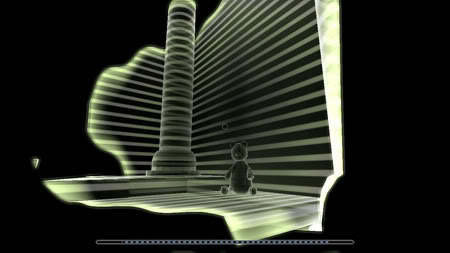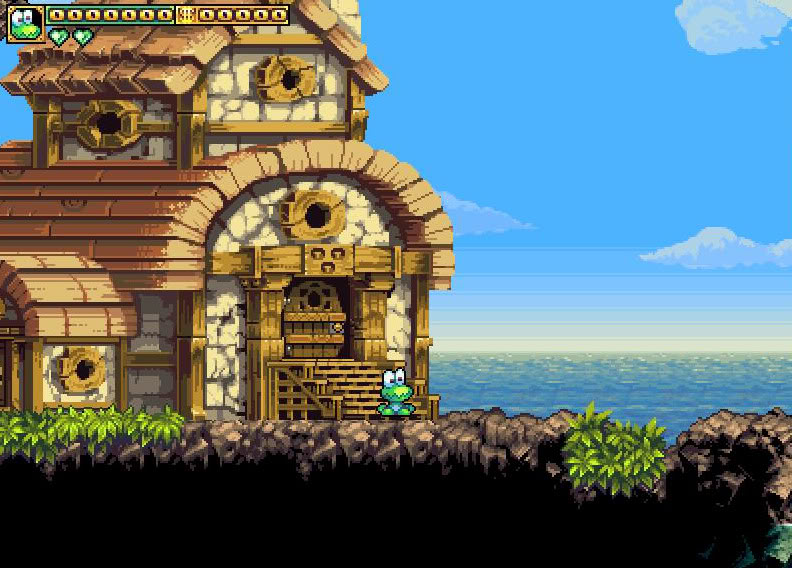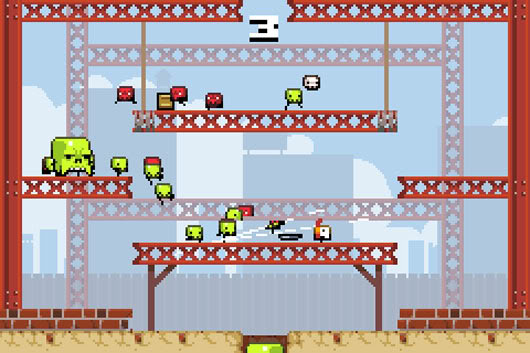This post has not been edited by the GamesBeat staff. Opinions by GamesBeat community writers do not necessarily reflect those of the staff.
Amid the pandemonium of top-tier releases and end-of-year award-giving, it's easy to forget that the sole bastion of ingenuity isn't Ubisoft, Sony, or Electronic Arts: The genesis of an idea is imagination, and every year, hundreds of independent developers try to make a name for themselves with creative concepts. In the end, we are the beneficiaries!
For proof of fact, take Portal's and Portal 2's basic conceits: Valve lifted the teleporting and gel-painting ideas for each from two gratis indie titles. (The games, by the way, are Narbacular Drop and Tag: The Power of Paint. Valve hired the staff of both to make those two titles. Awesome!)
You can play this game for free…. It's true!
So here we are at the start of another year, lists aflutter. And this is one more (list, that is): the five best free indies of the last 12 months. By my own count, I've played over 60 of these cheap, stupid, uninspired games. What can I say? I'm a poor, cheap bastard myself. But that does not denigrate the quality of these five titles; in fact, it uplifts them.
The goal: I don't want you to have to waste your time wading through the deluge of free-to-play games that have landed since January 1, 2010. Instead, here are a few titles that are — by my estimation — the best pay-nothing indies of the year:

Devil's Tuning Fork
Devil's Tuning Fork is an audacious project. It attempts to visually recreate the idea of sonic perception through onscreen display — sonar as “seen” through ocular mimetics.
The story is weird enough; toddlers and infants all across the globe have fallen into a coma state without scientific explanation. As the player, you awaken in a dream that seems related, and the screen is black. You hear a chime and see its sonic pulse waves moving across the screen. It guides you to a blivet apparatus. Once you acquire the blivet, which with a handle is in the shape of tuning fork, you can control the chimes.
Devil's Tuning Fork completely shrouds your vision in darkness, and your only way out is to listen by looking…using, oddly enough, an optical illusion to create pulse waves of sound. It's a pretty strange title with a perplexing premise. That alone is enough to check it out.
Play the game: Devil's Tuning Fork

Frogatto and Friends
As an 8-bit and 16-bit old head, I couldn't help but put Frogatto and Friends on this list. Frogatto is one of those rare sprite-based games that explodes with vibrancy and animation. Though the nuance of Frogatto's technical aspects may be lost on people who aren't huge fans of titles like Kirby's Adventure, Gimmick!, or Codemasters' Dizzy series, Frogatto's visuals are, at the very least, exceptionally delightful. And while it doesn't feature much story to speak of (I think Frogatto needs to get some money or something), the dialogue is actually very well written.
I do have to say that the platforming can be a bit sticky, especially where it concerns wall jumps, but for the low, low price of "free," Frogatto and Friends is definitely a must download.
Play the game: Frogatto and Friends (also available on the iTunes App Store for $0.99)
Hero Core
As a game, Hero Core is a bit like Metroid's exploration meets Gradius' bullet hell meets an early ZX Spectrum title: And yes, it's retro all the way. You fill the shoes of Flip Hero, a brave space warrior who has chased his archnemesis Cruiser Tetron across the galaxy in an attempt to foil his plans to destroy Earth.
While Hero Core doesn't do anything notably new, it has exceptional flair and style. It takes the shmup formula and adds a free-roaming environment replete with tons of power ups to help you out along the way.
The game features several gigantic boss battles and an eerie, Metroid-y score from chiptunes up-and-comer Brother Android. I'm not overselling the experience when I say that it has the polish of an old-school Samus adventure. It looks, feels, and sounds like a page out our favorite space-faring heroine's handbook.
Though it's not quite as innovative as the rest of the games on this list, Hero Core is easily the largest and most refined of the bunch.
Play the games: Hero Core (and its not-totally-necessary prequel)

Super Crate Box
OK, so I lied. Hero Core is not the "most refined" title on this list. But that's only because of Super Crate Box's super-narrow scope. All of the action in Super Crate Box takes place on one screen à la the original Mario Bros., and it mostly keeps you busy with a very simple distraction: killing everything in sight. The twist is that the game has a large arsenal of weapons — of varying effectiveness — that you don't get to choose from.
Let me clarify: In Super Crate Box, the goal is to collect as many crates (boxes?) as possible. That's your score. The trick is that every time you collect another cube-shaped packing container, you equip a new, randomly selected weapon. These armaments can range from a screen-filling minigun that rockets you across the board with its recoil to a tiny katana that amounts to little more than a very sharp knife.
Super Crate Box is very, very addictive. On top of its simple and ingenious risk-reward scoring system, it also has tons of unlockables that include the weapons themselves (you start with an incredibly lame pistol), new modes, and different screen configurations. When I downloaded this indie, I was literally stuck in my seat for three hours; I didn't even bother to check out the unlockables until the next day. The core mechanic is that engaging.
To put it simply, no other indie title I've ever played begs more for a well-done smartphone port with leaderboard functionality.
Play the game: Super Crate Box

Digital: A Love Story
The best thing I can say about Digital: A Love Story is this: It's in my top five games of the year. The problem with the game is that when you lay it out on paper, it doesn't sound very interesting.
Well, here goes, anyway: In Digital, you explore the local message boards (or, more technically, bulletin board systems) that comprised the earliest incarnations of consumer-level Internet access. As you take your new, Web-enabled rig out for a test drive, you get into a romantic interchange with another user on your local BBS. The thing is she (or he?) is not what she appears to be.
According to creator Christine Love — see what she did with the title there? — it's "a computer mystery/romance set five minutes into the future of 1988." That's about as accurate as any description of this game can get. In terms of genre, it falls somewhere between Japanese interactive fiction and an adventure title.
I don't expect that Digital will hit everyone as hard as it did me: I think you have to be a bit older to appreciate how authentic Love's recreation of the Amiga Workbench is. Also, the messages boards you go to are full of references to sci-fi mainstays that not everyone will appreciate.
But none of that is what makes Digital as great as it is: The key here is the fiction. Christine Love is an author who only dallies in game design. Her writing acumen allows her to create dozens of different voices, all reaching out across a technology in its infancy. Some BBS users have great grammar. Some don't. Some make rational arguments about their favorite hobby, and some…like to troll. If this all sounds familiar to you, as an video-game enthusiast, it should.
Love litters her narrative with clever ups and downs, and the authentic visuals and stellar soundtrack (also including Hero Core's Brother Android) really sell the tale. If you're a fan of the medium's storytelling capabilities, then Digital: A Love Story isn't just a must-play free-to-download game: It's one of this year's required readings.
Play the game: Digital: A Love Story
